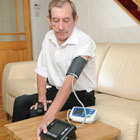All Scottish practices encouraged to introduce telehealth

All practices in Scotland should be encouraged to put in place telehealth services for at least one condition, a briefing document has urged.
It is part of a series of recommendations for general practice clusters on targets for improving care quality and safety.
It will be impossible for GPs to continue to care for patients in the same way with the number of long-term conditions in Scotland set to double in the next decade, the report from the Scottish School of Primary Care said.
‘Supported self-monitoring’ may be a more efficient alternative for managing patients with hypertension and diabetes, the summary of current evidence concluded.
‘General practice clusters should consider encouraging members to undertake telehealth in at least one condition,’ it said.
Report author Professor Brian McKinstry, professor of primary care ehealth at the University of Edinburgh and a GP in the city, said hypertension would be the easiest place for practices to start.
‘We have to be realistic about introducing technology,’ he said. ‘But I would like to think that within the next 10 year this will become the normal way to manage patients.’
He did point out that while the evidence for hypertension and diabetes was strong, at the moment he would not recommend practices using telehealth for COPD or asthma other than as part of research.
‘This looks good, and looks like it will help but until we do it we won’t know for sure.’
He added that any practice that was unsure could try the technology on a small number of patients to start with and he admitted that initially implementing such systems could be time consuming.
‘We find that once practices are doing it, they really like it and patients love it,’ he added.
Various schemes are already in place in Scotland with around half the practices in Lothian signed up to the SCALE-UP BP programme where patients with hypertension send blood pressure readings to their GP by text.
It is hoped 2,000 patients will be signed up to the project by next summer.
The recommendations were made in one of ten briefing papers designed to guide general practice clusters to where improvements can be made.
GP clusters – which will have a representative from every practice – were introduced in the 2016/17 GMS agreement to improve quality in health and social care.
RCGP Scotland chair Dr Miles Mack, said Scotland was in the greatly enhanced position of being able to reflect the needs of our localities through the quality clusters.
He said: ‘Where that need lies in hypertension, for example, it may well be that patients would benefit from telemedicine and that, then, should indeed be encouraged.’









